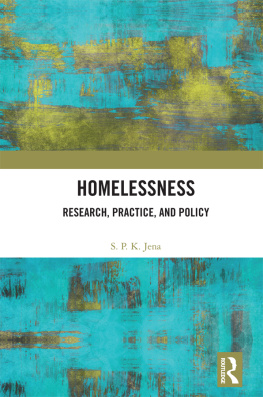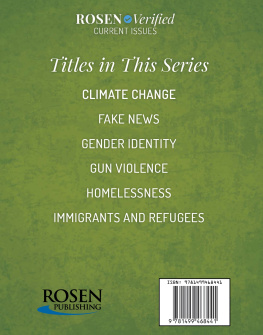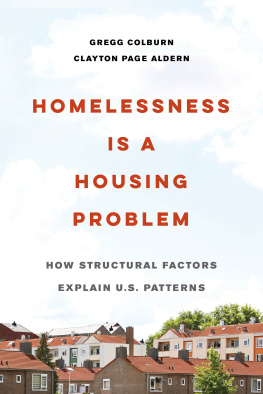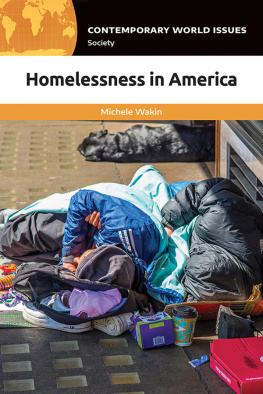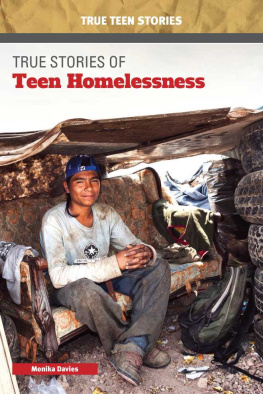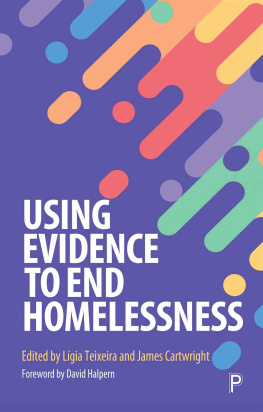
Changing the Paradigm of Homelessness
Changing the Paradigm of Homelessness offers a comprehensive look at family housing distress related to the homelessness epidemic in the United States. This book explores the causes and consequences of this epidemic and proposes drastic changes in Americas historically ill-fated approach to family homelessness. By describing this crisis in detail, the authors enlighten readers to the scope of this issue, describe those impacted by it, and outline ways to shift public policies and public perceptions. The authors interweave scholarly concepts with insights of those who are currently or previously homeless, and, in doing so, they show the importance of academic knowledge influencing policy decisions and the ways in which these influences impact the lives of real persons. This book, then, uses pedagogy, policy, and pragmatism to critique the United States approach to family homelessness.
Yvonne Vissing is a Professor of Healthcare Studies, and previously Professor and Chair of Sociology, at Salem State University, where she is the Founding Director of the Salem State University Center for Childhood and Youth Studies. She was appointed Policy Chair by the United Nations for child rights under the Convention on the Rights of the Child, and she is a long-term board member of the National Coalition for the Homeless.
Christopher G. Hudson is Professor Emeritus in the School of Social Work at Salem State University. In addition to his responsibilities at Salem State, he has been elected as the President of the 7,700-member Massachusetts Chapter of the National Association of Social Workers. He is the recipient of numerous awards, including the NAMI-MA Research of the Year Award, and two William J. Fulbright Senior Faculty Awards, one in Hong Kong (2002/2003) and the other in Prague, CZ (2017/2018). He has also taught and conducted research in international mental health at universities in Auckland, Hong Kong, Jerusalem, and London.
Diane Nilan is the founder and president of HEAR US Inc. and has three decades of experience running and managing homeless shelters and advocating for improved state and federal homeless policies. She has filmed and produced two award-winning documentaries My Own Four Walls and On the Edge: Family Homelessness in America, wrote the book Crossing the Line: Taking Steps to End Homelessness, and has given numerous university and congressional addresses on homelessness.
First published 2020
by Routledge
52 Vanderbilt Avenue, New York, NY 10017
and by Routledge
2 Park Square, Milton Park, Abingdon, Oxon, OX14 4RN
Routledge is an imprint of the Taylor & Francis Group, an informa business
2020 Taylor & Francis
The right of Yvonne Vissing, Christopher G. Hudson, and Diane Nilan to be identified as authors of this work has been asserted by them in accordance with sections 77 and 78 of the Copyright, Designs and Patents Act 1988.
All rights reserved. No part of this book may be reprinted or reproduced or utilised in any form or by any electronic, mechanical, or other means, now known or hereafter invented, including photocopying and recording, or in any information storage or retrieval system, without permission in writing from the publishers.
Trademark notice: Product or corporate names may be trademarks or registered trademarks, and are used only for identification and explanation without intent to infringe.
Library of Congress Cataloging-in-Publication Data
A catalog record for this title has been requested
ISBN: 978-1-138-36295-6 (hbk)
ISBN: 978-1-138-36298-7 (pbk)
ISBN: 978-0-429-43181-4 (ebk)
Typeset in Bembo
by codeMantra
Why is there so much homelessness when the nation has been addressing it for years? This is the underlying question that will be answered in this book. A second question addressed is What can we be doing better to prevent homelessness, especially for families?
Homelessness is both a personal and social problem. A national dilemma exists on how to address homelessness, confusion about how to feel about homeless people, and about what to do for, with, or about them. When we pass by them on the street, part of us feels pity and compassion, believing that we are our brothers keeper and have a moral obligation to help those in distress. Another part feels antipathy, disgust, even anger as we hustle past them. Simultaneously, we see them as both victims and perpetrators of their homelessness. We may feel a tinge of guilt for not sharing and caring, but often this guilt is offset by moral indignation, questioning why they arent doing more to live like good, upstanding members of society. Despite excuses to the contrary, homelessness is evidently a problem that we dont actually want to get rid of. If we did, as a nation we would be taking very different courses of action than the path weve created.
As your authors, weve worked for decades with homeless people, analyzing policies and conducting research, and were concerned that the rhetoric about homeless people, especially homeless families, doesnt fit reality as we see it. Misinformation is so common that it has been designated the 2018 word of the year (Diaz 2018). Erroneous assumptions have become egregious social policies. The conditions for people who are homeless, or on the brink of homelessness, are only going to get worse unless we change how we view and help them.
Policy makers and scholars rely on research to guide understandings and decisions. Studying homeless people is challenging in both definitional and methodological ways. Official reports state homelessness is declining; others report it is increasing. Which is it? There is hidden homelessness: couch-surfing, people over-staying welcomes with good-hearted people who havent (yet) thrown them out. Counting people is problematic. In New Hampshire, a school counselor provided accurate accounts of homeless students only to be criticized because it made the community look bad. The next year, she wasnt allowed to do the count, and amazingly the number of homeless students had plummeted (Vissing 1997). The numbers game behind homelessness is a big concern.
The paradigm the nation is using to address homelessness isnt working, especially for children, youth and families (Bassuk Center 2018b; Bassuk and Olivet 2016; Bassuk et al. 2014; Baumberg and Gaffney n.d.; Biello 2016). There are many different things that we could try that might prevent homelessness or help people to gain more stable, secure housing arrangements. In this book, we will analyze the current paradigm, explain how we got to it, and explore alternatives that may be more effective, both in human and economic terms.
Part I
Background of Homelessness in the US
In 1991, Gregg Barak, in his book Gimme Shelter, predicted homelessness would skyrocket unless we changed our housing and social policies. He advocated for a paradigm change that has obviously gone unheeded. He was correct homelessness has grown as predictably as was obvious 30 years earlier. While few could argue he was wrong, systems continue to operate as they always have which dont prioritize the needs of families and especially of those who are down-and-out. Today the housing crisis in America is a ticking time bomb thats only going to get worse, according to a Harvard University study (2018; Hobbes 2018). America cant solve homelessness because we cling to limited policy ideas and quick fixes (Hobbes 2019).


